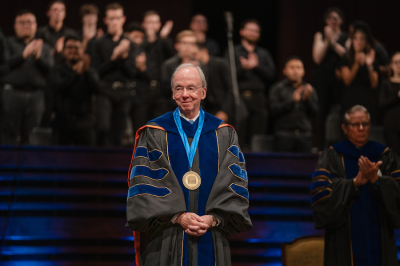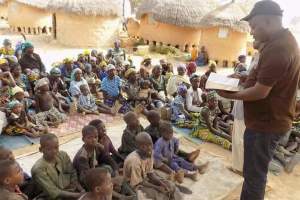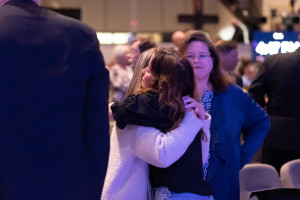American Christianity just got an engine boost of Gospel commitment

I believe that historians of American Christianity, looking back two decades from now, will identify Aug. 22, 2023, as a truly significant day in the history of 21st century Christianity in America.
Why? On Aug. 22, 2023, Dr. David Dockery gave his Convocation Address, having been inducted as the 10th president of Southwestern Baptist Theological Seminary (SWBTS) in Ft. Worth, Texas.
Dr. Dockery’s address is of pivotal significance for two reasons. First, SWBTS is an institution of critical importance to the future of the largest Protestant denomination in America, the Southern Baptist Convention. Founded in 1908, SWBTS has over the past 115 years become one of the two flagship theological seminaries among Southern Baptists, along with Southern Baptist Theological Seminary (SBTS) in Louisville, Kentucky, founded in 1858.
In addition to SWBTS and SBTS, Southern Baptists operate four additional official seminaries: New Orleans Baptist Seminary, Southeastern Baptist Seminary (Wake Forest, North Carolina), Midwestern Baptist Theological Seminary (Kansas City) and Gateway Baptist Seminary (Ontario, California). And while all six seminaries have played, and do play, a significant role in Southern Baptist life, historically, SWBTS and SBTS have been the flagpole institutions, with SBTS being the lead institution east of the Mississippi River and SWBTS fulfilling that role west of that great river.
For example, I am a graduate of New Orleans Baptist Seminary, but being a native Texan who grew up in Southern Baptist churches in the Lone Star state, I, like most Texas Baptists, consider myself a “Southwesterner” and SWBTS as “my seminary” in a very proprietary sense. Until I was a college senior I never even considered going somewhere besides SWBTS for my theological training (I believe God sent me to New Orleans seminary so I could meet my wife of 52 years who I met on my 23rd birthday in the seminary cafeteria — best birthday I ever had.)
It is doubtful that the Southern Baptist Convention can continue to be the driving engine that it has been historically in Evangelical American Christianity unless SWBTS is thriving, pledging deep allegiance to core biblical values, and committing to serving the local New Testament church.
In other words, what happens in Ft. Worth reverberates throughout North America and beyond. Where Dr. Dockery made his declaration of commitment to first Gospel principles is truly strategically important.
The second reason Dr. Dockery’s address is a truly significant moment in American Evangelical Christianity is provided by the content of his address — namely what he said.
So, what did he say? He began by revealing that this academic year commences his 40th year of service in theological higher education (in the interest of full disclosure, 40 years ago I offered Dr. Dockery his first full-time professorial appointment at Criswell College and he has been making me look good ever since).
Dr. Dockery declared at the outset of his message that he was leading SWBTS to a basic reaffirmation of the foundations of the historic Christian faith, “once delivered to the saints.” As SWBTS’ president, he declared, “each day, each week, each month, each semester, and each year” SWBTS will be seeking to fulfill its “primary mission of providing theological education which encourages the priority of the Great Commandment and the fulfillment Great Commission.”
Dockery acknowledges that “theology” can be threatening or suspicious to some because in church history it “has been the path down which some have traveled to open the door to liberalism, heterodoxy, or wrongheaded thinking or practice.” He acknowledged that Christians “must never allow theology to devolve into some kind of intellectual aloofness or uncommitted intellectual curiosity, which, as Francis Schaeffer warned in The God Who is There, can wrongly become some kind of game or mere intellectual exercise.”
Such past abuses must not turn us away from “theology,” which derives from two Greek words, logos (words) and Theos (God), i.e. words about God. Dockery contends that “theology done correctly is essential for the transmission of the Christian faith and is foundational, fundamental, and basic for theological education.” At its most elemental level theology in essence is “thinking rightly about God.”
In this foundational role, all Christians are “theologians.” Dockery correctly emphasizes:
[T]he Christian faith is much more than a personal and subjective experience. While Christian faith is an active and dynamic dependence on God for our daily walk with Him, a full understanding of the Christian faith recognizes that it is also ‘the body of truth’ delivered to the saints once and for all (Jude 3).
Thus, our understanding of the Christian faith certainly includes ‘belief in,’ but it is also imperative to recognize that it includes ‘belief that.’
By this we mean that our relationship with Jesus Christ comes about by believing and trusting in Him, but we must not fail to recognize that this Jesus is . . .the Jesus recognized by the apostles as ‘the Christ, the Son of the living God; as the one who is the radiance of God’s glory and the exact representation of God’s being (Matt 16; Heb 1). Thus, both the personal and the propositional understandings of Christian faith are necessary.
While acknowledging that “academic and public theology” have “a rightful place” in seminary education, “theology’s primary focus at Southwestern remains the church, and should be carried out primarily by ecclesial theologians, helping others reflect biblically and historically on the Triune God, His Word, His Work, His Will, and His world in order to prepare for a life of walking with God, worshiping and serving God, as well as serving others.”
Dockery references an important new study The Great Dechurching. Who’s Leaving, Why Are They Going, and What Will It Take to Bring Them Back by Jim Davis, Michel Graham and Ryan P. Burge, which details how Evangelical Christianity in America has experienced unprecedented decline since the early 1990s and has actually returned to the same percentage of adherents Evangelicals had in the 1970s prior to their surge of growth during the ’70s, ’80s and ’90s.
Dockery quite correctly identifies that “our failure to emphasize serious discipleship, worldview formation, and the importance of theology ... as the culture has become more secularized, polarized and confused” has played a major role in Evangelical decline.
Consequently, President Dockery proclaimed and pledged:
We take seriously our responsibility at Southwestern to set before the church and the world the pattern of Christian truth, which is grounded in the inspired and inerrant Word of God, which depends on the regenerated mind, and which exposes the radical difference between Christianity and the insufficient worldviews and philosophies.
I cannot speak for others, but for myself and my house, as a seven-decade Southern Baptist and a professing Evangelical, as I heard Dr. Dockery’s convocation address, I smiled and even “amened” a few times. Speaking as one devoted Southern Baptist, Dr. Dockery’s address exemplified and embodied what I envisioned when I first participated in the “Conservative Resurgence” starting in 1979 and I could not be more pleased that SWBTS is under such dedicated and capable leadership. I can also assure you that none of the six Southern Baptist seminary presidents in office in 1979 either could have or alternatively would have, delivered the address given by Dr. Dockery on August 22nd.
Never have Southern Baptists, Evangelicals, Americans, and the world more needed such dedication and piety. May Dockery’s and SWBTS’s tribe increase, and may God bless their efforts to serve Christ and His Church.
Dr. Richard Land, BA (Princeton, magna cum laude); D.Phil. (Oxford); Th.M (New Orleans Seminary). Dr. Land served as President of Southern Evangelical Seminary from July 2013 until July 2021. Upon his retirement, he was honored as President Emeritus and he continues to serve as an Adjunct Professor of Theology & Ethics. Dr. Land previously served as President of the Southern Baptist Convention's Ethics & Religious Liberty Commission (1988-2013) where he was also honored as President Emeritus upon his retirement. Dr. Land has also served as an Executive Editor and columnist for The Christian Post since 2011.
Dr. Land explores many timely and critical topics in his daily radio feature, “Bringing Every Thought Captive,” and in his weekly column for CP.




























